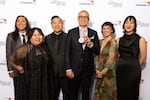
Chef Akkapong “Earl” Ninsom, center, and his team from Langbaan pose for a photo with their James Beard Award for Outstanding Restaurant, June 10, 2024.
Huge Galdones / Courtesy of the James Beard Foundation
The most outstanding restaurant in the U.S. is located inside another restaurant in Northwest Portland. It’s appropriately named Langbaan, which means “back of the house” in Thai, and serves a five-course tasting menu of elevated Thai food with Pacific Northwest ingredients.
It’s one of six restaurants from the culinary mastermind Akkapong “Earl” Ninsom, and this week Langbaan won the coveted and competitive Outstanding Restaurant category at the 2024 James Beard Awards.
Chef Ninsom joined OPB “All Things Considered” host Crystal Ligori to discuss the concept behind Langbaan, Thai food in the Pacific Northwest and what this accolade means for his team.
The following transcript has been edited for clarity and length.
Crystal Ligori: Each of your restaurants has a distinct style and cuisine. You can’t just say they’re simply Thai food. For someone who’s never eaten at Langbaan, how would you describe it?
Earl Ninsom: So Langbaan is a restaurant that transports you to a specific area or region of Thailand that’s underrepresented in the U.S. So we do research on how their life is, what ingredients they use and what kind of food they eat, and then add that to our five-course menu.
When I was in Thailand and had dined at restaurants serving similar kinds of food, sometimes the thing that I notice is if I don’t know what or how to order, I wouldn’t be able to order the right way…I wouldn’t be able to enjoy that as much as we’re supposed to be enjoying. So what we do is we sort of eliminate that issue. All the menu items that we have are meant to be eaten together — [if] one has flavors like spicy sours, the other might be sweet and salty. It’ll be a combined experience that you truly enjoy the meal family-style.
Ligori: I love the idea of taking out the guesswork [for your customers], especially because a lot of Americanized palettes are familiar with just one version of Thai food. They’re thinking of something just very simple like a Pad Thai.
Ninsom: When I moved to Oregon, the Thai food scene back in 2000 was trying to Americanize Thai food. At first it was OK for me, ‘cause I had never actually eaten that kind of food. But after a while, our food culture is so rich and diverse and you feel like there’s other things that we enjoyed when we grew up that doesn’t exist here. Why not offer it to [people who] don’t have a chance to experience it in our country. Our team is people who really love cooking and also it’s what they do really well. And this menu that we have, it’s helped them stay creative because the menu changes every two months.
Related: A Portland restaurant and chef each win coveted James Beard Awards
Ligori: Langbaan is on the high end of the restaurant scale — it is expensive — but you also have other restaurants that are more approachable in price. How do you think about the different kinds of restaurants that you want to open and who they’re for?
Ninsom: So because not everybody can afford Langbaan is the reason why we also open other more affordable [options] to people here in Portland. Some of them are less creative, more realistic to what we grew up eating in the country — like Hat Yai or Yaowarat or Paadee even. It’s comfort food or southern type food or Thai-Chinese food. And then a couple of them — Eem and Phuket Cafe — is more creative, more feeds off the energy of all these foodies who came to Portland. And we all bring different perspectives and we feel like all these people combined will create something special and something that only Portland would have. It doesn’t exist in Thailand.

Akkapong “Earl” Ninsom accepts the award for Outstanding Restaurant at the 2024 James Beard Awards in Chicago on June 10, 2024. He and his team from Portland's Langbaan won one of the most coveted categories of the night.
ELIESA JOHNSON / Courtesy of the James Beard Foundation
Ligori: This week your team won “Outstanding Restaurant” in the James Beard Awards. It’s an award that goes beyond just who has the most delicious food — It also looks at how the restaurant has contributed positively to its broader community. Can you talk about what that means to you to have Langbaan be recognized in this way?
Ninsom: First of all, it shows that a restaurant is not a one-person idea. It doesn’t work with just one person, it’s a sum of parts. Everybody has the same mindset, the same understanding: be kind to each other. We take care of each other, then we take care of our guests, then we take care of our communities.
It brings joy to us when we bring joy to others. And eventually, once you succeed, you want to make sure that your communities who have been supporting you also get benefit from what we do. For example, earlier this year when we had a snowstorm, we decided “Why don’t we just cook all this food that’s going to go to waste and give it away to everybody who needs it?” And since they’ve all been supporting all of us for all this many years, it’s our job to make sure they are taken care of in a way that we can. So we feel proud, [we] feel joy and the work that we do means something.
